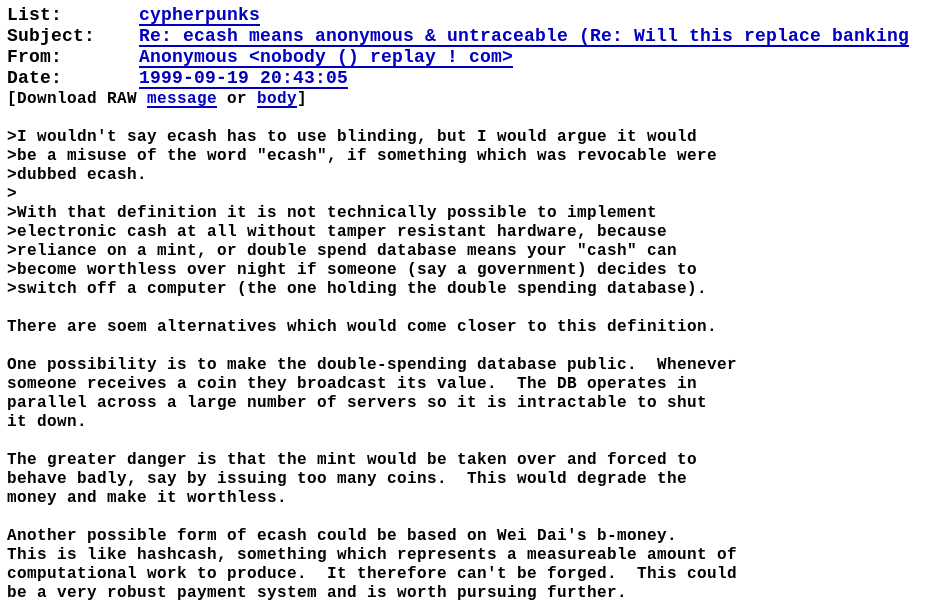The real identity of Satoshi Nakamoto, the anonymous creator of Bitcoin (BTC), remains one of the unsolved mysteries in the cryptocurrency industry. However, a recently discovered email from 1999 suggests that Nakamoto might have spent ten years to implement his idea of a peer-to-peer electronic cash system. The 200-words email, which was shared by Blockstream CEO Adam Back, is similar to the modern Bitcoin’s idealogy, including the anonymity of the creator. This perhaps suggests that it may have been written by Satoshi Nakamoto when he was younger. A True “ecash” Is Impossible To Shutdown Although no one is certain if the original Bitcoin creator sent the email note, the message was part of an electronic cash discussion among Cypherpunks at that time. Created in the 1980s, Cypherpunk
Topics:
Mandy Williams considers the following as important: AA News, btcusd, Satoshi Nakamoto
This could be interesting, too:
Bitcoin Schweiz News writes Die Geschichte von Bitcoin geht mehr als 40 Jahre zurück
Bitcoin Schweiz News writes P2P Foundation: Das Forum, das Bitcoin einer breiten Öffentlichkeit präsentierte
Chayanika Deka writes Yuga Labs Secures Major Win as SEC Closes Investigation Without Charges
Andrew Throuvalas writes Bitcoin Soars Back To ,000 After BlackRock CEO Says “Buy The Dip”
The real identity of Satoshi Nakamoto, the anonymous creator of Bitcoin (BTC), remains one of the unsolved mysteries in the cryptocurrency industry. However, a recently discovered email from 1999 suggests that Nakamoto might have spent ten years to implement his idea of a peer-to-peer electronic cash system.
The 200-words email, which was shared by Blockstream CEO Adam Back, is similar to the modern Bitcoin’s idealogy, including the anonymity of the creator. This perhaps suggests that it may have been written by Satoshi Nakamoto when he was younger.
A True “ecash” Is Impossible To Shutdown
Although no one is certain if the original Bitcoin creator sent the email note, the message was part of an electronic cash discussion among Cypherpunks at that time. Created in the 1980s, Cypherpunk is an activist group advocating cryptography, anonymity, and privacy. However, the Cypherpunks mailing list was not formed until 1992.
The anonymous author of the email said it would be a misuse of the word “ecash” to classify something if it is revocable and could be rendered useless by entities like the government.
“I wouldn’t say ecash has to use blinding, but I would argue it would be a misuse of the word ‘ecash,’ if something which was revocable were dubbed ecash.
With that definition, it is not technically possible to implement electronic cash at all without tamper-resistant hardware, because reliance on a mint or double-spend database means your ‘cash’ can become worthless overnight if someone (say a government) decides to switch off a computer (the one holding the double spending database),” part of the email reads.
From the above excerpt, it is quite hard to deny that Bitcoin was created with a similar idealogy. Today, it is impossible for any government in the world to control, alter, or stop the cryptocurrency from running, even if they pass all the laws they want.
The poster further presented some alternatives that could prevent the shutdown of electronic cash, including the use of a double-spending database and an ecash based on the Wei Dai’s b-money that uses hashcash.
Satoshi Had Basically Zero Spelling Errors

Despite how interesting it would be to know that the email came from Satoshi Nakamoto, it is hard to ignore the writing style and a few mistakes in the email note. For instance, writing “soem” instead of “some,’ and the use of “over night” as “overnight.”
Many believe that Bitcoin’s creator is too careful to make such errors. “Satoshi had basically zero spelling nor grammatical errors,” Back said.
